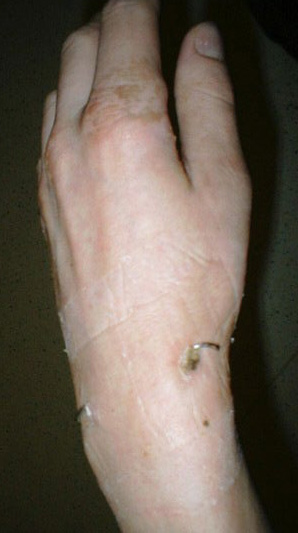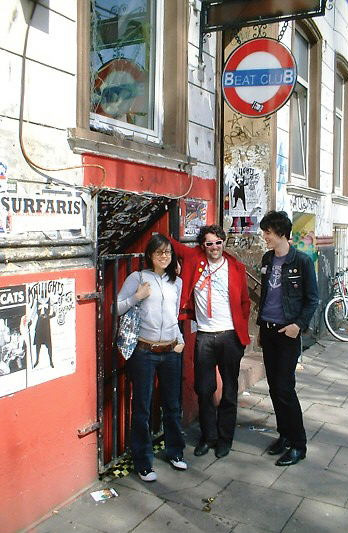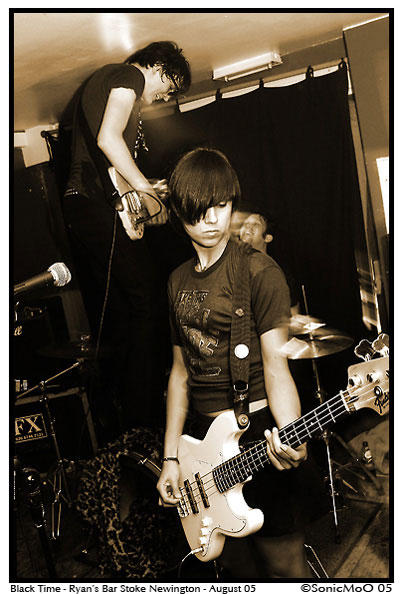
HOME � REVIEWS � CONTACT � LINKS � ARCHIVES � FORUMS
 |
| HOME � REVIEWS � CONTACT � LINKS � ARCHIVES � FORUMS |

|
|
One of the most disappointing things about this year's Chicago Blackout was the Black Time's show at the Whiteout (and the accompanying US tour) being cancelled due to Lemmy Caution smashing his wrist up to the point where he couldn't play. Seeing this band live was a big selling point for me making the trip to Chicago (as I imagine it was for many others as well), and as mad as I was at this cruel twist of fate, the Black Time still remain one of my favorite bands in current operation. TB has a loose policy of not interviewing the same band twice, but when our unofficial UK correspondent Derek contacted us with this update on activities from the BT camp, how could we say no? Read on for the latest in wrists, records, side projects and other happenings from Lemmy and drummer Mr. Stix... 
Terminal Bordeom: What happened with the US tour? LC: I think if we'd had a bit more notice, we maybe could have got someone in to play guitar or something like that. Mr. Stix: I think it was something like the week before. LC: Yeah, and I was in hospital for four days. TB: You were in the hospital for four days? LC: Yeah, because they had to do surgery on it. The bone shattered into four pieces, and they had to re-break it and straighten it out, and put these hooks in it. Then, I had to go back to hospital every week after the operation to have the cast changed and have it x-rayed. If it had been a bit less severe and we'd had a bit more time, like a month, we probably could have sorted something out. If there was any way we could have worked out to do it, I would have done it because I was really looking forward to going. It's pretty fucked. TB: What did you hear yesterday, when you got your cast off? LC: I was hoping to hear I'd be back playing in a couple of months but the doctor wasn't optimistic that I'd be playing anytime soon. I was hoping we could reschedule the US tour for September but the doctor said, no, it's going to be months and months and months. The rest of the year is kind of out for me doing band stuff: I'm pretty gutted about that. The other members of the band have their own things going, like Janie [Too Bad, bassist] has Sexaphone and Mr. Stix has this band called Blood Safari. MS: It's me, two guys who are in a band called the Parkinsons and a guy who's in a band called Penthouse. (To Lemmy Caution:) What would you say, it's like the Stooges or the Cramps? LC: It's kind of early-'80s, like the Gun Club, it's a little bit more powerful-sounding than Black Time. TB: Have you guys ever been to the United States? MS: I played some gigs there about three years ago with my old band, Police And Thieves, but that was just for, like, a holiday. I've just been to New York and that's it. TB: Were you looking forward to going? LC: Yeah, yeah, really. I had an opportunity to go a long time ago with an old band and the band broke up just before we were going to do the tour. That was seven or eight years ago. It's almost like a curse. (With Black Time) We were going to play with all these cool bands, like we were going play with the Cheater Slicks in Ohio and we were going to play with the Hunches in Portland. We thought, "Fucking hell, this is going to be amazing!" I don't know, maybe I'm cursed never to go. TB: Why did you want to tour the United States? LC: Just to kind of go there and see a bit of the world. We just want to play some punk rock and have good times. We've played a lot of places in Europe and it's been a blast. You don't really make any money out of touring, the kind of band we are, playing bar shows to not many people. It's kind of fun just because you're going to different places all the time and playing with bands from other countries and meeting new people that are into cool music. MS: You have some great stories by the end of it. LC: I'm not in the kind of income bracket where I'd be able to see a lot of these places unless I go there with a band. You might go on holiday to some of the big cities but you're not going to some of the places we were playing, some of the weird little towns. MS: Kalamazoo. LC: Yeah, Kalamazoo, or something. You get to play a show in some kid's basement and just hang out with some people, and have some crazy stories and stuff. MS: If you go on holiday, you're a tourist but, this way, you're with the band, maaan: you're above normal human beings. LC: Especially when you're a drummer because they have low self esteem.  TB: Where are some of your favorite places you've played?
TB: Where are some of your favorite places you've played?MS: Hamburg was pretty good. LC: Hamburg was really cool. Sweden was great. TB: Where did some of your wild stories take place? MS: Paris was one of the wildest: we got thrown back on stage. LC: We played some crazy bar... I had this idea that Paris was going to be, like... MS: Snobby. LC: Yeah, really snobby because I've been there as a tourist, and everything is overpriced and quite full of itself. We thought we'd be playing some kind of rock club where everyone's kind of got their arms folded and stuff... We played this bar in the Arab quarter called Le Gambetta: we turned up there and it was this sleazy... MS: Two old men arguing about The War. LC: Me and Mr. Stix were walking around the neighborhood before the show to kill time and there were all these kids hanging out on the street corner staring us out. We�re these strange looking white dudes in tight leather jackets � I think they thought we were English rentboys or something. We thought we were gonna get our heads kicked in. We played the bar and there were all these people having fights. The toilet was just this disgusting hole in the floor. It was this disgusting, weird place but the show was really amazing, the best show on the whole tour. Everyone was going really wild. We finished our set and they were kind of, like, "Go play another song, you fucking English poseurs!" We didn't have anymore songs and we left the stage. MS: There was a barricade separating us from the audience, they'd just set up a few chairs, and they were almost falling over the chairs. LC: Yeah, someone grabbed me by the belt and dragged me back up on stage and they picked up Janie and put her back on stage. MS: [Affecting a French accent]: "You fuckeeng Eengleesh fuckeeng mothairfuckairs, you will play some mure punk rock!" LC: We had to play some songs again, and do some fucking stupid covers and stuff. It was like this weird, degenerate audience was going to beat us up if we didn't play. That was fucking great. MS: Vera [club in Groningen, Netherlands] was good: great place. TB: Before, you were saying you prefer to play smaller, intimate gigs.... LC: Yeah, I think with really big shows, you just kind of feel alienated, like you're just sat in the back of some big venue and it sounds really shitty, like some big rock club P.A. It's OK if you're going to go see some stadium rock band, that's cool. MS: It's like a barrier: you're way up there, really far away. There's no direct interaction. Playing on the floor is the best. LC: I don't really like having stages because it's not like playing someone's basement or someone's party. MS: In the basement at Ryan's Bar [in London], you can walk around through the crowd and people are getting the singer with beer while he's playing: you can't get that with a big stage. LC: I think the kind of music I like and the kind of music we play is tinny, shambolic music and if it's coming out of some huge sound system, it almost makes it sterile. You should be where the audience is right there and you're not having to mic everything up and you can hear the fucking drums.  TB: [To Mr. Stix] You're from South Africa ?
TB: [To Mr. Stix] You're from South Africa ?MS: Yeah. TB: How long have you been in London? MS: Six years. TB: How would you say London affects the music you write and play? MS: For me, there are so many different scenes in London. In South Africa, it's just too small: you're either into rock or you're into hip-hop, but, in London, you can break it down into, like, 24 different genres and still have a big following with loads of different groups. TB: Were you involved with the "local scene" in South Africa? MS: Yeah. It was just a bunch of stupid shit. TB: For better or worse, London makes me feel dirty: like, I need a shower when I come here. LC: It's really a hard place to make music. The popular conception is that you have to move to London to play music because that's where the music industry is and that's where all the venues are but, actually, for a band like us, all the factors are against it because, if you're a punk rock band, you need a cheap place to live, and cheap places to record and rehearse, and to be geographically near each other. In London, it's a real uphill struggle because it's really expensive and everyone has to work really long hours to make rent. There's no living space where everyone rehearses in the basement; you have to rent a rehearsal room, and whenever you want to rehearse or record anything, you have to spend money on that. Everyone usually lives spread out across different parts of London, so you're having to travel, like, 40 minutes to get to rehearsal. But, in a way, it's a good thing because you have to really want to fucking do it. We went to this town in Switzerland and they get loads of money from the government, and they have this government arts center that's this old prison, and all the cells are rehearsal rooms. It's an amazing place and they've got a recording studio there, and a bar, and two music venues and a cinema. They've got all this stuff to make music and you get unemployment benefits just to be in a band but we were talking to the promoter, saying it must be a really good scene here and he said, "No, twenty years of this and this town hasn't produced one decent band." So, if you have everything done for you and you have all these facilities and all the money and all the resources, it doesn't necessarily mean you're going to produce good bands. TB: Your new record sounds, to me, at least, a bit more like rock 'n' roll, not as much cold noise as the first LP. LC: Our approach to recording it was really different. The first one was recorded at home and done in a really fragmented way over a period of time, we were trying out lots of different things; whereas the newer one, we actually recorded in one day. It's a lot more linear, like a band just recording a set of songs. It was our weird attempt at doing pop songs: I don't think we're a real poppy band, or whatever, but these songs just came out kind of "three-chord, one-two-three-four" songs. MS: The first LP sounded like shit; the second LP: well, it's not too bad. LC: We've got some more records coming out: we did a 7" on Bancroft Records, we did these three "budget rock" dance songs. Then, we've got a couple of four-track EPs coming out, one of them on an American label, Rehab Records and then one on an English label called Trakmarx; they should be out over the next few months. They're coming out in a limited edition of three copies, pressed on wood. MS: One of them's been pressed on cookie dough. Spend some more quality moments with Black Time at their Myspace page or have a go with their latest vinyl from the above labels, it's all choice work. Hopefully Lemmy will heal up nicely and that US Tour we were all looking forward will materialize once again. Interview by Derek |
| PREVIOUS PAGE � HOME � NEXT PAGE |